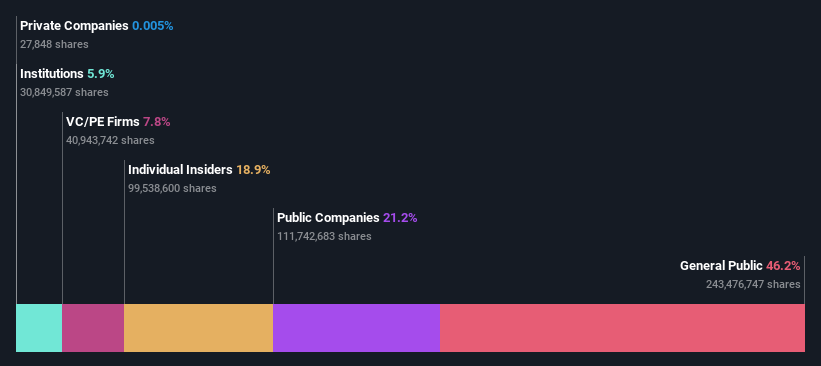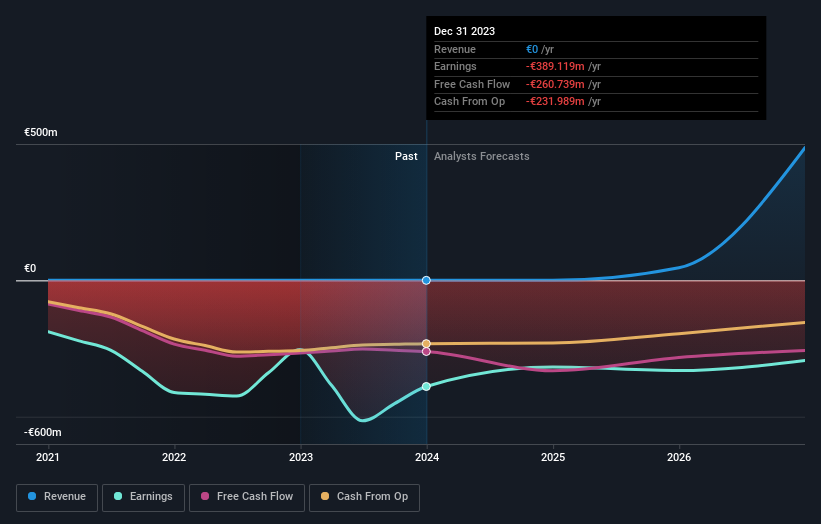Stock Analysis
- United States
- /
- Aerospace & Defense
- /
- NasdaqGS:LILM
Lilium N.V.'s (NASDAQ:LILM) market cap dropped US$59m last week; Retail investors bore the brunt

Key Insights
- Significant control over Lilium by retail investors implies that the general public has more power to influence management and governance-related decisions
- The top 9 shareholders own 50% of the company
- Insiders own 19% of Lilium
A look at the shareholders of Lilium N.V. (NASDAQ:LILM) can tell us which group is most powerful. We can see that retail investors own the lion's share in the company with 46% ownership. Put another way, the group faces the maximum upside potential (or downside risk).
And last week, retail investors endured the biggest losses as the stock fell by 12%.
Let's delve deeper into each type of owner of Lilium, beginning with the chart below.
See our latest analysis for Lilium

What Does The Institutional Ownership Tell Us About Lilium?
Institutions typically measure themselves against a benchmark when reporting to their own investors, so they often become more enthusiastic about a stock once it's included in a major index. We would expect most companies to have some institutions on the register, especially if they are growing.
As you can see, institutional investors have a fair amount of stake in Lilium. This can indicate that the company has a certain degree of credibility in the investment community. However, it is best to be wary of relying on the supposed validation that comes with institutional investors. They too, get it wrong sometimes. If multiple institutions change their view on a stock at the same time, you could see the share price drop fast. It's therefore worth looking at Lilium's earnings history below. Of course, the future is what really matters.

Hedge funds don't have many shares in Lilium. Our data shows that Tencent Holdings Limited is the largest shareholder with 21% of shares outstanding. In comparison, the second and third largest shareholders hold about 7.8% and 6.9% of the stock.
On further inspection, we found that more than half the company's shares are owned by the top 9 shareholders, suggesting that the interests of the larger shareholders are balanced out to an extent by the smaller ones.
While studying institutional ownership for a company can add value to your research, it is also a good practice to research analyst recommendations to get a deeper understand of a stock's expected performance. There are plenty of analysts covering the stock, so it might be worth seeing what they are forecasting, too.
Insider Ownership Of Lilium
While the precise definition of an insider can be subjective, almost everyone considers board members to be insiders. The company management answer to the board and the latter should represent the interests of shareholders. Notably, sometimes top-level managers are on the board themselves.
Most consider insider ownership a positive because it can indicate the board is well aligned with other shareholders. However, on some occasions too much power is concentrated within this group.
Our most recent data indicates that insiders own a reasonable proportion of Lilium N.V.. Insiders have a US$87m stake in this US$458m business. It is great to see insiders so invested in the business. It might be worth checking if those insiders have been buying recently.
General Public Ownership
The general public-- including retail investors -- own 46% stake in the company, and hence can't easily be ignored. This size of ownership, while considerable, may not be enough to change company policy if the decision is not in sync with other large shareholders.
Private Equity Ownership
With a stake of 7.8%, private equity firms could influence the Lilium board. Some investors might be encouraged by this, since private equity are sometimes able to encourage strategies that help the market see the value in the company. Alternatively, those holders might be exiting the investment after taking it public.
Public Company Ownership
We can see that public companies hold 21% of the Lilium shares on issue. It's hard to say for sure but this suggests they have entwined business interests. This might be a strategic stake, so it's worth watching this space for changes in ownership.
Next Steps:
It's always worth thinking about the different groups who own shares in a company. But to understand Lilium better, we need to consider many other factors. Case in point: We've spotted 4 warning signs for Lilium you should be aware of, and 2 of them are a bit unpleasant.
If you are like me, you may want to think about whether this company will grow or shrink. Luckily, you can check this free report showing analyst forecasts for its future.
NB: Figures in this article are calculated using data from the last twelve months, which refer to the 12-month period ending on the last date of the month the financial statement is dated. This may not be consistent with full year annual report figures.
Valuation is complex, but we're helping make it simple.
Find out whether Lilium is potentially over or undervalued by checking out our comprehensive analysis, which includes fair value estimates, risks and warnings, dividends, insider transactions and financial health.
View the Free AnalysisHave feedback on this article? Concerned about the content? Get in touch with us directly. Alternatively, email editorial-team (at) simplywallst.com.
This article by Simply Wall St is general in nature. We provide commentary based on historical data and analyst forecasts only using an unbiased methodology and our articles are not intended to be financial advice. It does not constitute a recommendation to buy or sell any stock, and does not take account of your objectives, or your financial situation. We aim to bring you long-term focused analysis driven by fundamental data. Note that our analysis may not factor in the latest price-sensitive company announcements or qualitative material. Simply Wall St has no position in any stocks mentioned.
About NasdaqGS:LILM
Lilium
Lilium N.V. engages in the research and development of electric vertical takeoff and landing aircrafts and jet for use in high-speed air transport system for people and goods.
Mediocre balance sheet with weak fundamentals.

